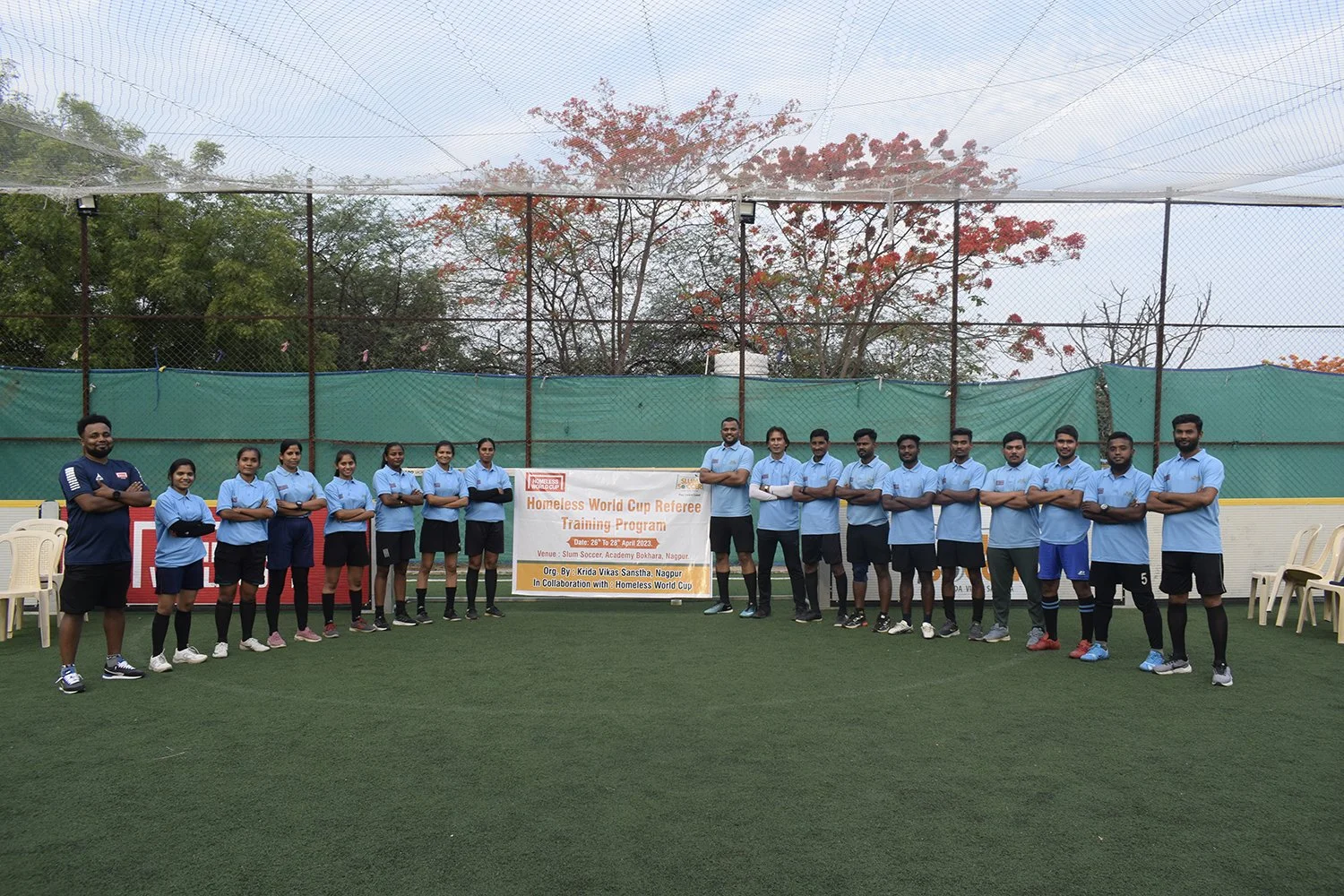Former Homeless World Cup players train as referees in India
| Participants are given their whistles as they start the referee training course. Image: Slum Soccer
Homeless World Cup referee training course is held in India for the first time
Homeless World Cup three day referee training programme starts in India
18 participants from India and Bangladesh are taking part
The course is led by former Homeless World Cup player turned referee Adil Leite from Norway
18 participants are taking part in a three-day Homeless World Cup referee training course led by Salvation Army (Frelsesarmeen)’s Adil Leite and hosted by Slum Soccer in Nagpur, India.
Adil Leite is a former Homeless World Cup player turned referee, who represented Norway at the Homeless World Cup in Poznan, Poland in 2013.
Of the 18 participants taking part in the training, ten are former Homeless World Cup players who represented India at various tournaments, from Paris in 2011 to Oslo in 2017. Indian participants are from different cities across the Maharashtra region, as well as some trainees from Delhi.
One participant from our Bangladeshi partner, Sports for Hope and Independence is also taking part in the training. The three-day course will give him the skills and expertise to train more referees when he returns and help our partner in Bangladesh to grow and develop their street football programme.
“Sometimes people estimate the role of a referee, but they actually play the biggest role in the game.”
The course will culminate in a day-long football tournament and festival on Friday. 70 participants will compete in the tournament with 12 teams. This will be a chance for the referees to put their training into action. The tournament will have teams of varying ages and genders to give the trainee referees an opportunity to practice in a variety of different settings.
Pankaj Mahajan from Slum Soccer is hopeful that the training course will encourage more players to become referees.
“At the moment only one player out of 20 wants to become a referee. They think, ‘there is joy in playing football, joy in coaching football but where is the joy in just blowing a whistle?’ We want to break this cycle. I believe that a referee is a peacemaker. Sometimes people estimate the role of a referee, but they actually play the biggest role in the game.”
|Male and female players are training as referees during the three day course. Image: Slum Soccer
Pankaj and the team at Slum Soccer have done a lot of work over the last ten years to build their number of trained referees. They’ve come a long way since when they started in 2011.
“We didn’t have referees in 2011, so when we had local tournaments, I would referee, and I didn’t know anything! I was just blowing the whistle and I didn’t know when to blow the whistle! Everyone would say, ‘This is not right! This is not right! Why are you blowing the whistle?’”
At the end of the game, Pankaj spoke to Slum Soccer CEO Abhijeet Barse and they decided something needed to be done about it. They worked together and created their own referee training programme. Since 2011 they have run 20 referee training programmes.
Initially Pankaj was disappointed because few players were interested in becoming referees, but Abhijeet told him not to be disheartened.
“We started the referee training and slowly, slowly, we have built the numbers of referees. Now we have more referees than ever before! Whenever we have a tournament, we come together, we refresh, and we do it.”
“Now we have more referees than ever before”
There’s also a current shortage of referees in the region. Pankaj tells me that in Nagpur “there are not more than 4 certified referees. They are just blowing whistles.”
This causes frustration with players and the crowd and has even led to violence breaking out against the referees.
But this isn’t the case at Slum Soccer, Pankaj explains “people respect this place a lot.”
At the beginning of each training course, he always tells the story of his first experience refereeing, which helps to break the ice.
“I tell newcomers and they laugh but this is the passion I have, and I want to share that passion. I didn’t know anything, I learnt everything and now here I am here in front of you. Being a referee is the position I like the best. It brings me joy.”
The key, Pankaj explains, is having role models for people to look up to. This is what the Homeless World Cup players become when returning from the tournament, and he hopes this is what the new referees will become, especially if they can referee at the Homeless World Cup.
“You need at least one role model, children, youth – they want to live up to their parents’ expectations and become role models. Here we are creating role models through the referee training programme.
This is the first ever referee training programme organised by the Homeless World Cup and it is going to be wonderful.”
Find out more about Slum Soccer and their work in Nagpur and in regions across India using football to promote social inclusion.


